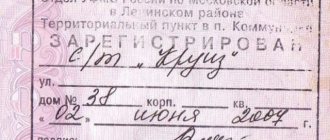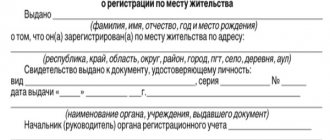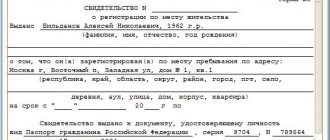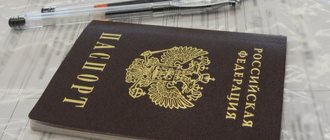Pravozhil.com > Registration and registration > Temporary registration > Address of residence - what is it, how does it differ from the place of residence?
We are free to choose where to live. But freedom comes with a number of conditions. It is important for the state to monitor the population and be aware of migration processes, for which citizen registration is used. It is based on a note in the passport about the point of permanent territorial “reference” of its owner.
If circumstances force you to settle in another region for a long time, you will have to acquire another type of registration: at the place of stay. The address of the place of residence - what it is, when you need to register with the migration department, whether fines are provided for violations and other aspects of this population registration will be discussed below.
Registration of citizens at the place of stay
In recent decades, population mobility has increased dramatically.
- Economic boundaries between subjects have been erased: large enterprises have their branches in several regions and send specialists from one region to another.
- Any citizen, in search of a better life, for family reasons and other reasons, has the right to move for temporary residence to a territory of his choice.
Therefore, the temporary format for registering citizens, which was once “in the shadows,” has received a “second life.”
Increasingly, the address in the passport is only a formal sign, and the person is located and, most importantly, exercises his civil rights in a completely different territory.
The concept of address of residence
What is a residential address?
Within the meaning of Art. 2 Federal Law 5242-1 and Section I of the registration rules, registration at the place of residence is considered to be a residential or non-residential premises that has become a temporary shelter and does not serve as a place of residence. This:
- hotels, sanatoriums, boarding houses;
- camp sites, holiday homes;
- medical institutions;
- establishment of a system for the execution of criminal punishments;
- and others.
The management of institutions is obliged to independently register their guests.
Now let’s take a closer look at the category of place of residence (location). This is where a person settles down for temporary or permanent residence. Migration legislation includes:
- apartments, individual housing construction objects, rooms;
- special fund housing
Other residential premises where a citizen lives temporarily or for the most part.
Table
| Location | Place of stay |
| Corresponds to a residential property in which a citizen lives permanently, for example, his own apartment | Corresponds to a residential property in which a person lives temporarily - for example, a room in the hotel where he is staying, or a rented apartment in another city |
| Assumes permanent registration (registration) | Involves temporary registration (its duration is determined by the owner of the apartment or the terms of the rental agreement) |
| Registration at the place of residence is confirmed by a stamp in the citizen’s passport | Registration at the place of stay is confirmed by a special certificate |
Can there be a place of stay without a place of residence?
What is the difference between place of stay and place of residence?
Quite. Here are the most common situations:
- a citizen is deprived of housing for some reason: fraudulent actions, destruction of property, etc. He is assigned to a boarding house and registered at such a place;
- disabled children who were abandoned by their parents, placing the person in social support boarding schools;
- the person does not own real estate where he can register himself;
- a citizen deliberately does not register in his own apartment, being temporarily registered in a completely different region.
None of the legislative acts introduces a direct ban on this state of affairs. But there is a requirement: if there is no permanent registration, the citizen is obliged to apply for a temporary option within 7 days.
The concept of place of residence - what is place of residence
So that citizens of the country can exercise their legal rights in the region in which they live, and also to know where a particular person lives on a permanent basis, a record of citizens is kept at their main place of residence. That is, the place of residence is the housing in which a person is constantly, most of the time. In such an apartment/house, this citizen must have permanent registration (a stamp indicating the presence of which is placed in the passport).
If a person moves to another area, he will have to be discharged from his permanent home and re-registered in the region where he is going. Permanent registration (until 1993 - registration) can be issued in residential premises such as an apartment, house, rented housing, dormitory, room, boarding school, service apartments.
The procedure for registering certain categories of citizens
Features of temporary registration of a separate category of citizens
The law identifies several social groups of the population for which special registration conditions apply.
Minors
The child is registered at the place of residence of the parents. And if the owner of the premises has already accommodated the mother and father of a minor, then the child automatically receives the go-ahead for official registration at the chosen address.
The list of documents is small: passports of representatives, a child’s birth certificate and an application in the form of the migration department.
Military personnel
Before a military man under a contract is provided with housing, when he does not yet have a place of residence, registration takes place at the location of the military unit.
When a military member's vacation exceeds 90 days, he needs to apply for temporary registration. The basis is a business trip or ticket.
Refugees
The regional migration unit works with internally displaced persons. Registration of refugees is carried out by issuing them directions for settlement.
How to apply
Registration is carried out by the territorial bodies of the Ministry of Internal Affairs. Urgent or permanent will be done at the migration registration departments. They do not charge any money for services.
To register, you need to choose a suitable time to visit the inspector and prepare a package of documents. It’s easier to sign up through the government services portal, but you still have to go to the Ministry of Internal Affairs.
They will register you at the address where your temporary home is, which means at your place of residence, if you have the following documents:
- the applicant's identity card (passport of the person who is going to register);
- application for registration in the approved form;
- a document confirming the legality of providing temporary registration. This is a certificate of state registration of the right to the owner’s residential premises, rental agreements, including social ones.
Application form
If all documents are in order, the applicant will be issued a certificate of registration (Form No. 3) within 6 working days. It states for how long a person is allowed to legally reside at a given address. That's what registration at the place of stay is: it is limited in time. When the period expires, the citizen will automatically lose his temporary registration.
Form form No. 3
If you want to register in your own new permanent home, which means at your place of residence, you will need to register:
- identification;
- application for registration at a new residence address and deregistration at the previous one. Both - on a common form (form No. 6);
- a document confirming the right to live in the premises - a rental agreement, an extract from the Unified State Register of Real Estate, an application from the owner to move in, a court decision, etc.;
- written consent of all owners of residential premises for registration (if any).
Even if you sign up through the government services portal, you will have to go to the Ministry of Internal Affairs: inspectors personally check the documents.
Application form
Within 6 working days, the application will be reviewed and registered in the new location. Evidence of this will be 2 stamps in the passport - about deregistration and about registration. This is the difference between registration at the place of residence and stay: the latter has time limits, while the former is unlimited.
About the author of the article
Alena Motroi Journalist, worked for almost 10 years in major socio-political and business print media in Chisinau.
Registration of foreign citizens and stateless persons
Features of temporary registration of foreign citizens and stateless persons
This contingent is subject to mandatory special registration if they stay at a specific address for more than 7 days.
The general rules are:
- a foreigner enters privately for a long period by invitation;
- the hassle of registering falls on the inviting party;
- The basis for registration is the migrant's card and international passport.
After entering the territory of the Russian Federation, an immigrant fills out a temporary registration form for foreign citizens and sends it by mail or in person to the migration division of the Ministry of Internal Affairs.
They can refuse on the following conditions:
- lack of residence on the territory of the Russian Federation;
- when a citizen of another state visits the country to work on a rotational basis.
What documents are needed to obtain permanent registration?
Important! If a person decides to cancel his permanent registration (check out) to move to a new place of residence, he will have to prepare a certificate of absence of debts for utility services.
To register at your place of permanent residence, you must prepare a minimum package of documents, including:
- application for registration in residential premises;
- citizen's passport;
- a document confirming the existence of rights to move into an apartment/house (application from the owner of the property, an extract from a court decision, a certificate of ownership, a lease agreement).
How can a foreigner extend his stay in the Russian Federation?
Is it possible to extend the temporary registration period?
When the period of the official residence permit is about to expire, a foreigner can act in several ways to renew it:
- the simplest and most unpopular method is to leave the country for 3 months and then cross the border again;
- a troublesome, but also providing good prospects, method is official employment in an enterprise or organization under an employment contract.
Expert opinion on the question of how to register correctly
Employees of the Main Department of Migration Affairs of the Ministry of Internal Affairs explain the procedure for registering at the place of permanent residence and temporary stay - the procedure is extremely simple, since a person can often exercise the basic rights of a citizen only if he has registration.
Currently, registration can be completed by contacting a department of the Main Department of Migration Affairs of the Ministry of Internal Affairs, a multifunctional center (the MFC sometimes requires even fewer documents than the Main Department of Migration Affairs of the Ministry of Internal Affairs), or by sending an application through the State Services website (pre-registration with identification confirmation is required).
Registration is completed within 3-5 days, after which a person can pick up a stamped passport. As for temporary registration, this can be done by the owner of a rental home or an employee of a sanatorium, recreation center, hotel and other residential complexes.
What points do you need to know about check-in?
- Once you find yourself outside the administrative boundaries of “your” region, you don’t have to think about registration nuances until 90 days have passed from the moment you move into the premises. Then – temporary registration at this location.
- To carry out all checks of submitted papers, the law allocated 3 days for a written application, 8 days for an electronic application.
You can open a temporary residence for a maximum of 5 years. If the settler lives in the owner’s housing, the accounting period at the place of stay is agreed upon with the owner of the premises.
Residence address - what is it?
This concept is defined in Russian Government Decree No. 713 of July 17, 1995, which approves the rules for registration and deregistration within the country. It follows from the rules that the location of stay is the territory where a person does not live on a permanent basis (rest home, hotel, hospital, boarding house, rented apartment).
Total: the registration address at the place of residence is the location of the object where you live only for a while, periodically or temporarily. You must register there after 90 days from the date of arrival. If the period is shorter, you do not need to register.
Hotels, holiday homes and other institutions independently transmit information about guests to the registration authorities. But if you need a document confirming your residence on their territory for more than 3 months, you must apply in person.
As for rented apartments (rooms), then, according to the law, they also need to be registered. But owners often refuse to register tenants, not wanting to lose benefits when paying for utilities and pay taxes on income received. Another reason is the opinion that temporarily registered residents will have the opportunity to dispose of housing or property. A person registered on the territory of his stay is no different from a guest who is officially allowed to live in an apartment (room). He does not have any rights to the premises itself.
In addition, non-permanent registration at the place of residence is a right that is given for a certain period - by agreement with all owners. Upon expiration, the urgent registration is cancelled.
Legislative time-out
How long can you not register at your place of residence?
Three months of unregistered residence in temporary territory is allowed. But nothing more. Why is this deadline set?
- A lot of people are traveling around the country on their next vacation, and how many business travelers are coming to another region for a week or two. Just imagine for a moment that the whole stream will pour in to register a short-term trip.
- A short tour of the country does not make changes to the socio-economic structure of the subjects. Travelers will continue to receive all benefits at their permanent place of residence and it is unlikely that they will go to work for a month or even three vacation periods.
If a person plans to stay in the region for more than three months, it is mandatory to obtain a migration permit. The purpose of staying at the registration address does not affect the registration procedure in any way.
The algorithm in standard cases is universal for everyone:
- preparation of documents;
- visiting the Federal Tax Service department for consultation;
- submitting an application and package of papers;
- obtaining permission to stay in the region.
Types of registration
Depending on the length of a person’s stay, there are different types of registration. Exists:
- temporary;
- constant.
For permanent residence, permanent registration is used. If a person is temporarily forced to move to another locality for a period of more than 90 days, then he must obtain a temporary registration.
However, the main registration is not cancelled. A master registration may only expire under certain circumstances other than lapse of time. A temporary one expires upon the expiration of the specific validity period for which it was issued. But it can be extended an unlimited number of times.
Permanent registration
Grounds for termination of the main registration can only be significant circumstances, such as:
- death of a registered person;
- filing an application for deregistration by the citizen himself;
- registration at a new address;
- if a person is declared missing by a court;
- in case of transfer of property rights to third parties for whom the registration of this person is an unnecessary burden;
- in some other cases provided for by law.
If a citizen resides permanently in an apartment, he or she must register there within 7 days. The legal grounds on which he can permanently reside at this address may be the following:
- The citizen is the owner of this property.
- A person lives at this address on the basis of a rental or rental agreement, as well as other types of transactions giving the right to reside.
- Due to the presence of family ties with the owners of the property.
To register on a permanent basis, a citizen must:
- Collect the necessary documentation.
- To write an application.
- Submit all documents to the registration authorities.
- Receive the result in the form of a stamp in your passport or in the form of a registration certificate if you do not have a passport (for minors).
The main documents that will need to be provided to obtain permanent registration are:
- personal passport of a citizen of the Russian Federation;
- title documents for housing, if available;
- consent of the owners in case of registration of a non-owner;
- permission from municipal authorities in the case of registering a person in municipal housing;
- certificate of the size of the family registered at this address;
- documents confirming family ties;
- application requesting registration.
Registration is carried out within 3 days. After accepting the papers, the registration authority employee will inform you of the date and time when you can receive your passport or certificate.
To register children if one of their parents is registered at this address, permission from the property owners and the municipality is not required.
Temporary registration
Based on documents confirming the actual temporary stay of a citizen in a given locality, a certificate of the established form 8 is issued, which is filled out on a special form. This form has a specific identification number, which is listed in the general migration database.
To obtain it, you must go through a similar algorithm as when obtaining permanent registration. Only deregistration will not be carried out at the place of permanent registration. The result of registration will be the issuance of a certificate.
This document has the following data:
- barcode and identification code in the left corner;
- the title of the document is in the middle of the document at the very top;
- certificate number in the upper right corner;
- personal information about who this document was issued to, as well as information about his date and place of birth;
- address of the person’s place of residence;
- validity period of this document;
- passport details of the citizen;
- name of the authority that issued this certificate;
- position and personal details of the official who signed the document;
- Federal Migration Service stamp and date of issue.
To obtain such documentary evidence of temporary registration, you need to collect the following documentation:
- personal passport;
- statement;
- papers giving grounds for legal residence in this residential premises;
- consent of the homeowner.
Once these documents are submitted, staff will officially notify the homeowner and their guest that the application has been received. If both confirm their agreement to temporarily register this applicant, the certificate will be issued within 3 days.
Features of temporary registration in certain regions and cities
Temporary stay restrictions
There are territories and areas where a regime for the presence of citizens has been established. Here are the restrictions on temporary stay:
- border strips;
- closed military settlements;
- closed administrative-territorial regions;
- environmental disaster zones;
- regions with the risk of spreading epidemics of infectious and non-infectious diseases with the introduction of limited visits and special business conditions;
- territories under martial law or emergency situations.
In the first four groups, special regulations are valid indefinitely, in the remaining ones - for a limited time, depending on the decisions of local authorities.
Legislation
Depending on these concepts, the legislation establishes various requirements for registration of citizens. For example, a person must be registered within 3 months if his stay in a given locality is planned for longer than 90 days.
Violations of this legislation are subject to administrative penalties. Moreover, it is imposed not only on the citizen who violated the registration procedure, but also on the owner of the home where the violator lived all this time. However, the owner’s guilt must be proven with documents.
For a violator of the registration procedure, the fine will be 1,500-2,000 rubles, and for the home owner - 2,000-2,500 rubles. Thus, the owner of the property should not prevent a person who legally lives in his apartment from obtaining temporary registration.
Nuances
Nuances of temporary registration at the place of stay
Temporary registration covers long-distance travel, when a person leaves the area of permanent registration and goes to another subject.
When a citizen travels around the region or region of permanent registration, there is no need to register the address of the place of stay. For example, Krasnoyarsk permanent registration will allow you to live freely in any locality of the Krasnoyarsk Territory.
Also, you will not have to register your stay in the Moscow and Leningrad regions if your place of permanent residence is Moscow and St. Petersburg, respectively.
If a tenant makes life difficult for others, he can be evicted. But this will have to be done in court. In most cases, the courts side with the owners (unless there are children and teenagers), but it is still worth inviting the settler to move out on his own.
If the period of temporary stay has expired, registration is automatically terminated. Additionally, there is no need to attend migration.
You can find out about the temporary registration of Russian citizens in Moscow by watching the video:
See also Telephone numbers for consultation May 07, 2021 kasjanenko 836
Share this post
Discussion: 3 comments
- Mikhailenko A.P. says:
02/04/2019 at 23:28Many of our citizens are completely unaware of the fact that if a person’s place of permanent registration is in the same city where he lives at a different address (for example, a son is registered with his parents, but moved out with his girlfriend for rent), then the law allows him not to register in the mandatory order exactly at the place of stay. This is written down in plain text in the Administrative Code of the Russian Federation. Dishonest people often take advantage of this ignorance.
Answer
- Ivan says:
02/17/2019 at 13:17
What responsibilities does the owner of the property assume that the opportunity to indicate his address as his place of residence provides? Should this necessarily be reflected in the house register?
Answer
- Lyudmila says:
08/23/2019 at 19:31
I came across the fact that landlords do not want to provide temporary registration to a family with a child. And children may really need temporary registration; they need to enroll in school or kindergarten.
Answer
Application and responsibility
Now all this knowledge can be applied to reality.
Life without registration
A rented apartment is still a temporary residence address. By law, we can live there for three months without registering at our residence address. It's the same with guests. If you went to visit and stayed there for more than three months, then you need to register.
What if you, say, own two apartments? You are only allowed to register in one of them. What to do in this case?
According to the law, within 7 days after you arrive to permanently live somewhere, you must register there. That is, you need to register in the apartment where you permanently live.
Obviously, not every owner who rents out his apartment will want to register tenants there. And not everyone has the opportunity to register as a long-term guest. What consequences should you expect?
There is an article 19.15 in the Code of Administrative Offenses, according to which living without registration entails the imposition of an administrative fine in the amount of 2,000 to 3,000 rubles. In Moscow and St. Petersburg, fines are even higher - from 3,000 to 5,000 rubles.
In other words, registration at the place of residence for citizens of the Russian Federation is mandatory, as well as at a permanent address. If you live somewhere without registration (temporary or permanent), then you may be fined for this. But only if they prove that you live at this address permanently, and must be registered at your place of residence. Or that you have been living at this address temporarily, but for more than three months. And that means they must register.
How to prove this? Well, if the local police want, they have the right to interview, for example, neighbors who will say that you have been at this address every day and night (constantly) for a long time (more than three months).
Visiting another city
But here’s another situation: let’s say I’m registered in Moscow. And I decided to go to St. Petersburg. I'm walking down the street. And suddenly a policeman stops me and asks for my passport. And then, seeing that I have a Moscow residence permit, he asks about registration. But I don't have it.
What are the consequences? Yes, none. First of all, I am a citizen of the Russian Federation. And Article 27 of the Constitution of the Russian Federation states “Everyone who is legally present on the territory of the Russian Federation has the right to move freely, choose their place of stay and residence.” The same is stated in the law “On the right of citizens of the Russian Federation to freedom of movement, choice of place of stay and residence within the Russian Federation” No. 5242-1 of June 25, 1993. Article 1: “In accordance with the Constitution of the Russian Federation and international human rights instruments, every citizen of the Russian Federation has the right to freedom of movement...”.
Thus, any citizen of the Russian Federation has the right to stay on the territory of the Russian Federation without any permission to do so. And registration at the address of residence or stay has nothing to do with it. Maybe I just arrived yesterday. Or even two months ago. Prove that this is not so. We have a presumption of innocence, by the way. And secondly, the Code of Administrative Offenses says that being at the address of stay or residence without registration... And I have already given definitions to these terms above. As a citizen of the Russian Federation, they have no right to fine me for being on the street without registration.
Place of actual residence
The place of actual residence is the housing in which a person stays temporarily. Under these conditions, a person can only have temporary registration or no registration at all. The actual residence of citizens is confirmed by documents, for example, a lease agreement.
Address of registration and actual residence - what is the difference?
Registration address is the housing where the citizen is registered. The person informs the state where he lives. Registration is the responsibility of citizens; a mark indicating its presence is placed in the passport.
If the registration does not coincide with the actual address, then it is imperative to inform the government authorities, since a person who does not have registration at the place of residence does not have the right to take part in elections or be assigned to a school or medical institution.
To register, you should contact the migration service and provide: an application, a passport, as well as a document giving the right to a person to live in a specific place (for example, a rental agreement).
It will be interesting:
Sample certificate of income to social security
What documents prove the identity of a citizen?
The application for registration includes the following information:
- FULL NAME.
- Date of Birth.
- Citizenship.
- Passport.
- The address where registration is planned.
- Documents proving the citizen's right to the object.
- The address at which the citizen was previously registered.
The package of documents can be brought in person or sent by mail .
The address of a citizen’s actual place of residence is the address at which you actually live, and not formally on paper.
Attention! You have 7 days to register at your place of residence. Otherwise, you will have to pay a fine in the amount of 2000 - 3000 thousand rubles.










